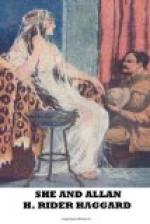“Hans is making coffee,” I said warningly.
“Thank you,” he answered, “I forgot. Force of habit, you know.”
Here I may state that never from that moment did I see him touch another drop of liquor, not even when I drank my modest tot in front of him. His triumph over temptation was splendid and complete, especially as the absence of his accustomed potations made him ill for some time and of course depressed his spirits, with painful results that were apparent in due course.
In fact, the man became totally changed. He grew gloomy but resourceful, also full of patience. Only one idea obsessed him—to rescue his daughter and avenge the murder of his people; indeed, except his sins, he thought of and found interest in nothing else. Moreover, his iron constitution cast off all the effects of his past debauchery and he grew so strong that although I was pretty tough in those days, he could out-tire me.
To return; I engaged him in conversation and with his help made a list of what we should require on our vendetta journey, all of which served to occupy his mind. Then I sent him to bed, saying that I would call him before dawn, having first put a little more bromide into his third cup of coffee. After this I turned in and notwithstanding the sight of those remains of the cannibal feast and the knowledge of the dead men who lay outside my window, I slept like a top.
Indeed, it was the Captain who awakened me, not I the Captain, saying that daylight was on the break and we had better be stirring. So we went down to the Store, where I was thankful to find that everything had been tidied up in accordance with my directions.
On our way Robertson asked me what had become of the remains, whereon I pointed to the smouldering ashes of one of the great fires. He went to it and kneeling down, said a prayer in broad Scotch, doubtless one that he had learned at his mother’s knee. Then he took some of the ashes from the edge of the pyre—for such it was—and threw them into the glowing embers where, as he knew, lay all that was left of those who had sprung from him. Also he tossed others of them into the air, though what he meant by this I did not understand and never asked. Probably it was some rite indicative of expiation or of revenge, or both, which he had learned from the savages among whom he had lived so long.
After this we went into the Store and with the help of some of the natives, or half-breeds, who had accompanied us on the sea-cow expedition, selected all the goods we wanted, which we sent to the house.
As we returned thither I saw Umslopogaas and his men engaged, with the usual Zulu ceremonies, in burying their two companions in a hole they had made in the hillside. I noted, however, that they did not inter their war-axes or their throwing-spears with them as usual, probably because they thought that these might be needed. In place of them they put with the dead little models roughly shaped of bits of wood, which models they “killed” by first breaking them across.




